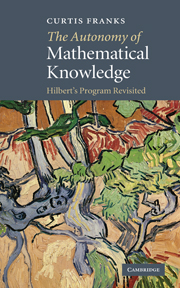1 - A new science
Published online by Cambridge University Press: 07 January 2010
Summary
RECOVERING HILBERT'S THOUGHT
No one disposed to judge the worth of an idea by its impact on culture through contributions to art and science would too quickly dismiss David Hilbert's philosophy of mathematics. Although he worked in an era when mathematicians were especially prone to reflect on the nature of their discipline, when philosophies of mathematics numbered nearly as many as great mathematical minds, the innovative research spawned by Hilbert's unique views stands out for its lasting imprint on mathematical practice. Yet oddly, few people today endorse his views. In the main, they are deplored.
I find this paradox intolerable, and I hope to dissolve it by unearthing its origins. This will be somewhat arduous, but it is worth the effort. Hilbert's ideas have not been rejected because of their faults, but because his true vision is unknown. The excavation that follows will, I hope, expose the genius of his philosophical vision and its essential connection to his mathematical innovations.
In the early twentieth century, Hilbert invented a new formal science – the study of the global properties of branches of mathematics like number theory, analysis, and group theory. This invention allowed one for the first time to investigate in a scientific manner whether, for example, the principles used by analysts are consistent or whether, to take another example, the principles used by group theorists suffice to answer all questions about groups. Hilbert's vision involved two steps.
- Type
- Chapter
- Information
- The Autonomy of Mathematical KnowledgeHilbert's Program Revisited, pp. 1 - 28Publisher: Cambridge University PressPrint publication year: 2009

